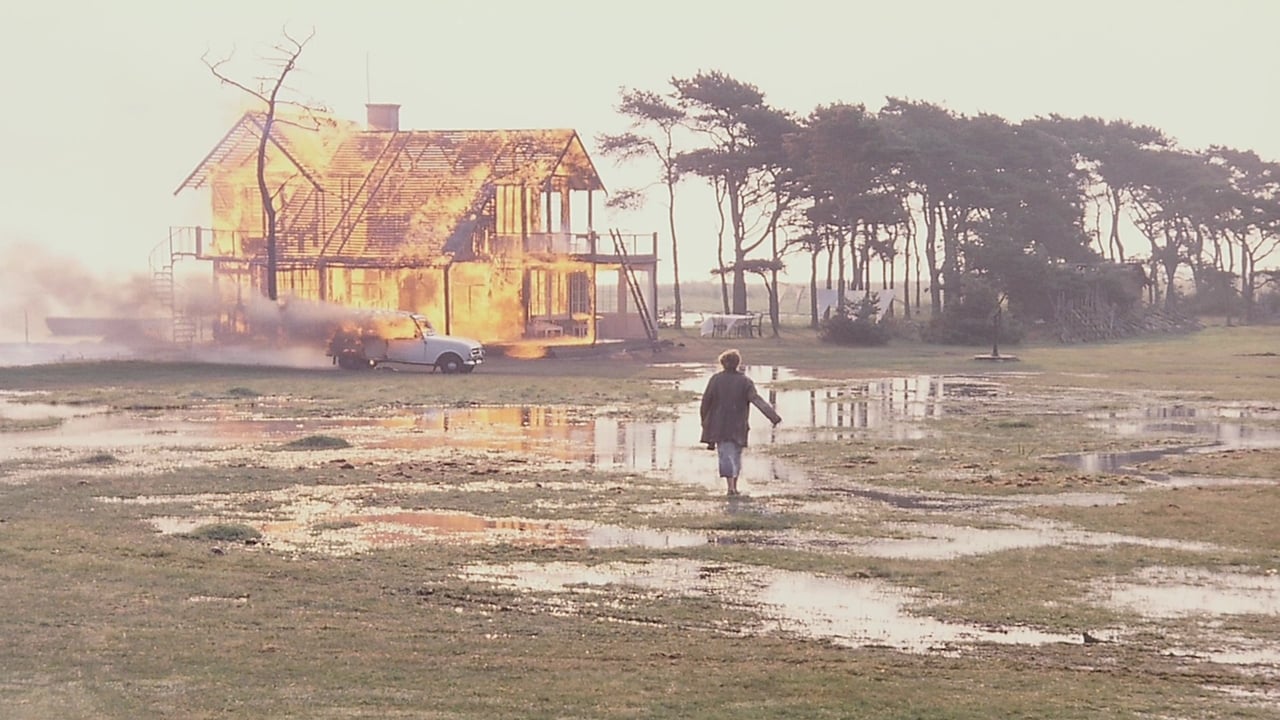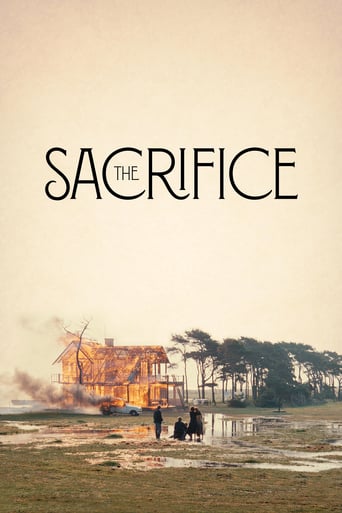Breakinger
A Brilliant Conflict
ChampDavSlim
The acting is good, and the firecracker script has some excellent ideas.
Phillipa
Strong acting helps the film overcome an uncertain premise and create characters that hold our attention absolutely.
Billy Ollie
Through painfully honest and emotional moments, the movie becomes irresistibly relatable
k-tester98
I have seen this movie only once, when I was nine or ten. I have never forgotten it and I still can see the perfect, emotionally wrenching scenes: The mother's hysterics after the announcement of the war, the wide-eyed hiss, "You must sleep with the witch!", the wicker chair catching in flames, the nude girl chasing chickens through a cool and silent house...There is a sort of grief in the movie's tone; the prolonged shots allow the viewer to feel as though they are standing there observing the events and not actually watching a movie.I am reminded of Ingmar Berman's 'The Seventh Seal', a movie which ranks along with 'The Sacrifice' as my top favorite. Both are terribly bittersweet and leave me feeling like I need to go to church.The whole of the film is incredibly beautiful. Watch it and remember it.
drarthurwells
This movie is beautifully filmed, in the style of I. Bergman. That is enough to make the critics rave about it.However, it is, as Shakespeare might say, sound and fury signifying nothing.An insane man becomes delusional and thinks that a nuclear WW III has started, but he can make things revert back to peacetime if he makes a sacrifice.Actually if we all would kill ourselves there would be no more war. One person's sacrifice is not enough to assuage the gods, however.If you like nonsensical films, like "Tree of Life" or "Holy Motors", you might like this one.Too bad a beautiful production was wasted on this film.
Jose Cruz
Tarkovsky last film is still what we can expect given his previous films. This one, though, is darker in tone, certainly related to the fact that the director was dying of cancer while filming his last film. Tarkovsky is perhaps the greatest art film director who ever lived and it shows on all his films.Like The Mirror and Nostalghia, this film has gorgeous cinematography and it is worthy of watching only for the images. It is essentially plot less, though I have watched only once and thus I failed to absorb everything in this complex work of art.Given the impression it made on first watching I would rate it as inferior to Nostalghia, Andrei Rublev and the Mirror and roughly equivalent to Solaris. Still, it is great and rises above 99% of all films. Highly recommended for everyone who has the patience and the open mind to watch art films and I note that I am not the single biggest fan of art films.
chuck-526
The story takes place in an isolated location on the isle of Gotland in the Baltic Sea. Although the island has a long semi-independent history, it has been an "official" part of Sweden for more than three centuries.Many of my reactions to this film are the common ones: this film is "Bergmanesque", a little different from yet not discontinuous with Tarkovsky's others; the images are striking and almost overwhelmingly powerful; the film is long and slow ("stately" to say it positively), so much so some won't have the patience to even finish watching it.I think though the story is more complex and subtle than is often stated. Supposedly the topic is a slightly off-kilter person giving up what he loves in exchange for the salvation of others as a reaction to the specter of nuclear war. After all, his life circumstances look pretty attractive to us viewers: wealthy, respected, private, and comfortable. The ominousness of the opening dialog doesn't seem warranted.But I think it's more than that, or at least more ambiguous than that. The main character isn't just slightly off-kilter, but close to collapsing completely. His life has become unbearable. And his motives are as much about "punishment" (or even "revenge") as "sacrifice".Why do I think that? For starters, how is it that the only people that will come to Alexander's birthday party are his doctor and his postman? That guest list sounds to me like an act of desperation, an admission that he's hit rock bottom. Alexander's wife is so neurotic even her daughter and her lover chide her. His daughter can't grow up in such an isolated place; she never sees anyone else anywhere near her age. And as far as her obvious age-appropriate interest in boys, there's nothing more than a bad joke about the postman being her beau. She flips between acting like she's ten and acting like she's thirty, with nothing in between. Alexander sleeps on the couch in his office rather than in the marital bed , and everyone acts as though that happens all the time. When he bicycles to his servant's house (or at least dreams he does), along the way he sees the doctor's empty car with his wife's shawl; clearly he's aware that his wife is having an affair with his "best friend". His servant's immediate reaction is "something terrible must have happened at home", and it's apparent this isn't the first time she's seen Alexander's home situation become intolerable. And the doctor's plan to move to Australia is a truly momentous, one-in-a-million attempt to escape forever. The doctor's calm, detached, slightly ironic bearing belies the awfulness of the words he speaks about just how dysfunctional Alexander's household is.

